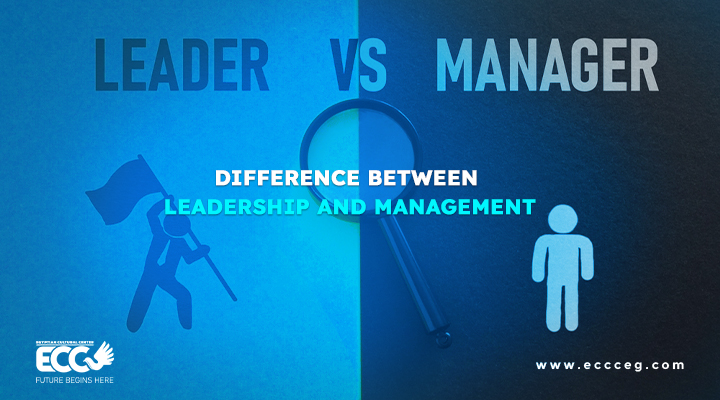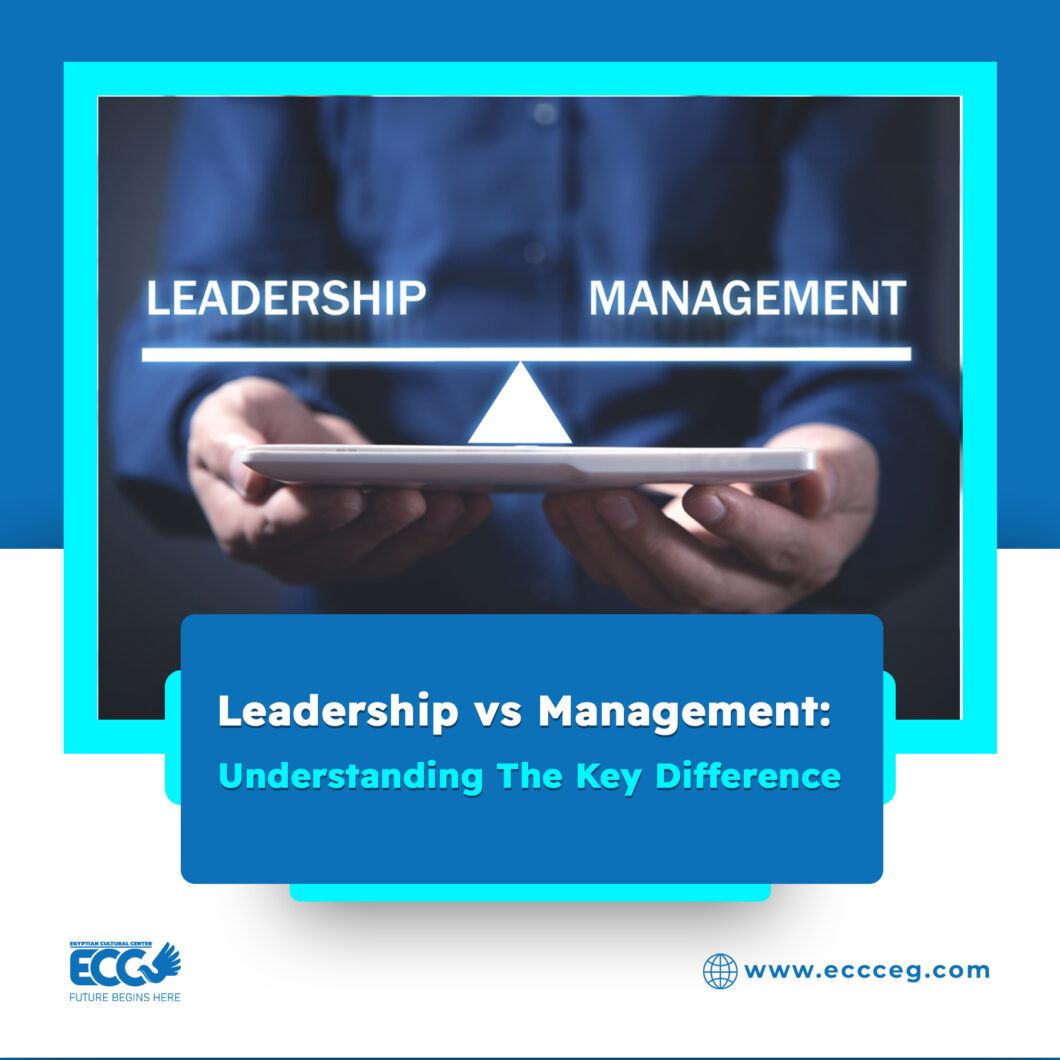What are the differences between management and leadership? Are you a good manager, naturally a good leader? These and other questions…
Today, management and leadership are used interchangeably. However, even when they pursue similar objectives, they are radically different.
The term “manager” is often associated with someone who tells other people what to do, while a “leader” inspires others to do their best through their unordered words and actions.
These role representations, although semi-accurate, make us think that it is naturally better to be called leaders than managers. However, it is important to know that both are necessary for an organization.
As we will see, if an organization functions efficiently, leadership and management exist in tandem.
So, what is the difference? Let’s see…
Read More: What Is a BBA? Your Guide to the Bachelor of Business Administration
What is Leadership?
Leadership consists of helping and inspiring people to achieve extraordinary results, to generate excellent capabilities. Leadership is an activity of guiding and directing people to work together to achieve goals. It requires good vision and thinking beyond what is established.
Leaders are people who ask themselves certain questions and commit to the answers they articulate:
About us? Where is the world headed? Who will we be in a changing world? What do we need to become what we want to be?
Leadership is not about titles, seniority, status, or management. A leader is someone who makes certain offers, requests, and promises. A leader generates an interpretation of the present, declares the possibility of a different future, and is capable of generating trust in other people.
The authority of the leader is given by the community that is led. To be a leader it is not enough to make a statement. The leader develops from his commitment to the mission and his competence in keeping people together. Leadership will become evident when people give the leader the authority to lead the team toward mission success. Management and Leadership: Understanding the Differences
Contact with IBAS: +201000498154
What is Management?
Management is the process of managing. As a manager, you are responsible for the operation and administration of the company and its workforce. This role ensures that the infrastructure for operations runs smoothly that everything is exactly where it needs to be when it needs to be, and that work is documented where necessary.
Managers are people who plan, organize, and coordinate. They are methodical and always evaluate their process to ensure they are progressing as planned. If not, they adjust to return to their baseline assessment.
In this way, management is necessary to ensure that an organization knows what needs to be done and to set clear objectives to meet those objectives. This can be anything from increasing profit margins to improving customer feedback.
Additionally, managers are responsible for top-down perspectives in companies. They are often the eyes and ears of the business, and their influence is widely felt throughout the company. Ultimately, they work behind the scenes to ensure the business runs as smoothly as possible.
Read More: Supply Chain Management vs Logistics: Differences, Similarities and Roles
Difference between leadership and management

Leadership and management are not the same.
A manager manages, copies, maintains, focuses on system and structure, relies on control, has a short-term vision, asks how and when has an eye on the result, imitates, and accepts the status quo, and It’s like a classic good. Soldier, and he does things well.
A leader innovates, is original, develops, focuses on people, inspires confidence, has a long-term perspective, asks what and why, has an eye on the horizon, originates, challenges the status quo, and he is an individual who does the right thing.
- Origin
- Manager: is A person who becomes a manager by position.
- Leader: is A person who becomes a leader based on his personal qualities.
- Formal rights
- Manager: has formal rights in an organization due to his status.
- Leader: Rights are not available to a leader.
- Followers
- Manager: Subordinates are followers of managers.
- Leader: People who had the same ideology as the leader.
- Features
- Manager: performs all functions of management.
- Leader: influences people to work well to achieve the group’s goals.
- Need
- Manager: is essential for a concern.
- Leader: is required to create a correlation between people working in an organization.
- Stability
Manager: Management is more stable.
Leader: Leadership is temporary.
- Mutual relationship
- Manager: All managers are leaders.
- Leader: Not all leaders are managers.
- Responsibility
- Manager: is responsible for the behavior and performance of himself and his subordinates.
- Leaders: do not have a well-defined responsibility.
- Concern
- Manager: A manager’s concern is reaching organizational goals.
- Leader: A leader’s concern is that the group’s goals meet the satisfaction of the members.
- Followers’ reasons to follow
- Managers: People follow the manager by job description.
- Leaders: People follow them willingly.
- Continuation of the role
- Manager: may continue in office until he or she performs his or her duties satisfactorily in congruence with the organization’s objectives.
- Leader: can maintain his position thanks to the daily wishes of his followers.
- Sanctions
- Manager: has control over the assignment and distribution of sanctions.
- Leader: has control over different sanctions and records of related tasks. Sanctions are essential due to their informal nature.
Contact with IBAS: +201000498154
Similarities between management and leadership
Although management and leadership have different objectives, there are some similarities between both concepts:
Both focus on the long-term success of the company and require strong communication and decision-making skills.
In an effective company, management and leadership work together to achieve the organization’s objectives.
Both elements are essential to manage a sustainable and efficient company over time.
Read More: How To Become a Project Manager: Tips, Skills and MBA major
How to Develop Leadership and Management Skills?

9 ways to develop your leadership skills
The possibility of reaching the top in one’s professional field is what makes it possible for many people to continue working, perfecting their leadership skills, and undertaking new projects. However, at a certain point, professional development depends on more than just technical skills and a willingness to work hard. A series of social skills are also needed, which does not exclude the ability to assume a leadership position.
Some people are natural leaders, but everyone can develop the necessary skill set with some practice. If you want your career to go as far as possible, you must be willing to put in the work.
These 9 strategies will help you develop your leadership skills and continue advancing in your professional career.
- Put discipline into practice
A good leader needs discipline. Developing discipline in your professional (and personal) life should serve to make you an effective leader and inspire others to be disciplined as well. People will judge your leadership ability by how disciplined you are at work.
You can show off your discipline at work by always respecting deadlines, keeping appointments, and finishing meetings on time.
If you are disorganized by nature, you have a lot of work ahead of you, but you can always start small: try to adopt good habits at home, such as getting up early, exercising daily and, above all, work towards the goal.
- Take on more projects
You don’t have to take on more work than you can handle, but if you want to grow, you have to do more than just limit yourself to what is expected of your position. Getting out of your comfort zone is the only way to learn something new, and if you do, you’ll stand out to executives as someone who takes initiative.
- Learn to delegate
You should not feel threatened when someone disagrees with your opinion, questions your thinking or proposes their own ideas. Keep an open mind and recognize credit where there is merit. It won’t always be easy, but if you learn to value and respect other team members, they will be more willing to assume their responsibilities.
- Know the situation
What distinguishes a good leader is that he is able to take a broader perspective and anticipate problems before they arise. This is a valuable skill to have when managing complex projects with tight deadlines. The leader’s ability to foresee and offer suggestions in order to avoid possible problems is priceless. This ability also helps you recognize opportunities that others overlook, so you are sure to gain recognition.
- Inspire others
Being a leader means being part of a team and being able to motivate and inspire colleagues to collaborate in the best way possible. When one of your team members needs support or guidance, offer it. Sometimes all a person needs is someone to listen and show empathy.
- Keep learning
The best route to becoming a good leader is to keep learning new things. Your mind will always be sharp and your leadership skills up to date. It prepares you for new challenges that may appear, something that is always valued in a leader.
- Empower your teammates
No one is the best at everything, and the sooner you realize it, the sooner you will learn to be a good leader. Delegating tasks to other people not only frees you up to do other things you are better at; it also empowers other team members.
- Resolve conflicts
Not everyone is going to always get along.
don’t ignore interpersonal conflicts or wait for them to go away, address them by talking privately with the people involved.
in case the conflict cannot be resolved, you have to be willing to reassign team members
- Listen with insight
Becoming a leader does not mean always being the center of attention. One of the most important traits of a good leader is knowing how to listen to other people’s proposals, ideas and opinions and carry them out. People who know how to listen take into account that communication is not just about words, non-verbal language is also important, such as eye contact and body language.
Good leadership skills are essential to advancing your career, but as you can see, leadership is much more than just being in front. As American statesman John Quincy Adams stated: “If your actions inspire others to dream more, learn more, do more, and become something more, then you are a leader.”
Contact with IBAS: +201000498154
To begin your journey in studying an MBA with the Egyptian Cultural Center, register now for a free consultation with one of our educational consultants through the following link: https://eccceg.com/


